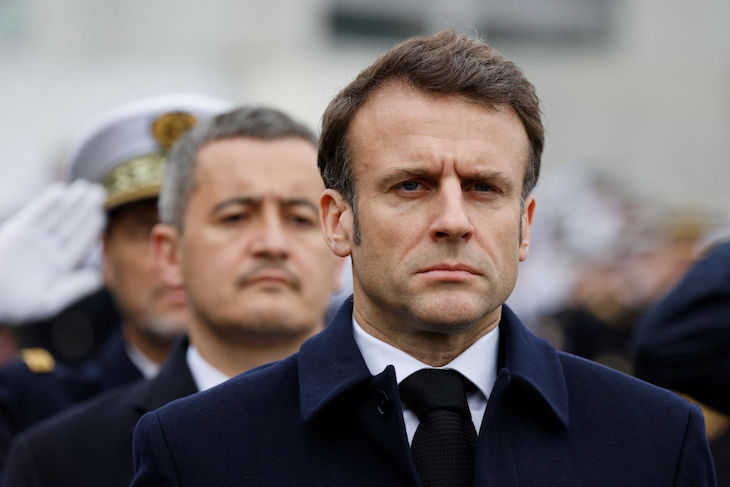Donald Trump made headlines this month when he claimed that London and Paris are no longer recognisable because ‘they have opened their doors to jihad’. It was a characteristically provocative statement from the former US president, and one that had his many enemies huffing and puffing with indignation. Trump was wrong to describe the two cities as ‘unrecognisable’ but he was right in saying that a ‘jihad’ is being waged.
The Brotherhood’s most successful achievement has been the introduction of a new word: Islamophobia
‘Jihad’, at least to non-Muslims, has violent connotations but the word means ‘struggle’ or ‘utmost effort’, and so there are also ideological jihads. This is the jihad that is being waged against the West this century.
In what may come to be regarded as one of the most significant interventions by the government of Emmanuel Macron, Gérald Darmanin – the French Interior Minister – gave a remarkable interview to a newspaper at the weekend. The subject was the Muslim Brotherhood, described by Darmanin as a ‘vicious organisation’. As he explained, the Brotherhood doesn’t wage violent jihad, but deploys ‘much gentler methods…[to] gradually bring all sections of society into the Islamic matrix’.
Darmanin’s remarks were clearly made with the approval of Macron. The president has authorised the Ministry of the Interior to compile a report on the threat posed by the Muslim Brotherhood. In a communique announcing this task, the ministry stated; ‘Islamist separatism is a theorised politico-religious project…aimed at building a counter-society. The Muslim Brotherhood plays a major role in disseminating such a system of thought.’
Darmanin intends the report to be ‘a wake-up call’ to the methods of the Muslim Brotherhood. ‘They attack all areas of society and form a network: sport, education, medicine, justice, student and trade union organisations, NGOs, politics, associations and culture,’ said Darmanin. ‘They give voting instructions, support community businesses, use anti-French rhetoric, launch petitions, surround local elected representatives, sign economic partnerships with major brands.’
But the Brotherhood’s most successful achievement has been the introduction into the West of a new word: Islamophobia. ‘This is their word, and it covers their primary strategy, that of victimisation,’ said Darmanin.
For example, when pupils started arriving at school last September wearing Islamic dress, it was a flagrant challenge to France’s secularism laws. But it was twisted by some to make it appear that Muslims were being victimised.
Darmanin’s remarks have been welcomed by specialists in the field of the Muslim Brotherhood. Prominent among them is Florence Bergeaud-Blackler, who has been studying the movement for three decades and as a consequence requires police protection. In her 2023 book about the Brotherhood, she wrote that ‘their goal isn’t to adapt Islam to Europe but to adapt Europe to Islam’.
Austria outlawed the Muslim Brotherhood in 2021, but no other European country has followed suit. Darmanin said there will be no ban in France because ‘that is quite simply impossible’; this is because of the Brotherhood’s secretive nature and lack of defined hierarchy.
Instead, what is required is a ‘European awakening’, which Darmanin said he is pleased to see happening in Germany and Sweden. German intelligence is reportedly monitoring the activity of the Islamic Community of Germany, an organisation overseeing a network of mosques and cultural associations.
One country Darmanin didn’t namecheck as being alert to the threat was Britain. Here the Brotherhood is flourishing in a country notoriously naïve – in French eyes – about Islamism. In his 2019 book about the Muslim Brotherhood, The Project, Alexandre del Valle (who collaborated with MI5 during his time in French intelligence in the 1990s and was shocked by their insouciance) explained that, in the aftermath of the 2005 London bombings, the organisation was seen as the ‘moderate’ voice of Muslims. Del Valle alleged that the Muslim Brotherhood has strong links to the Muslim Association of Britain (MAB) – a claim denied by the MAB. In March this year, Michael Gove named MAB as a group of ‘Islamist orientation and beliefs’, and he said the government was considering classifying the organisation as extremist. MAB responded by threatening legal action.
This is perhaps not a surprise. A report in France this week by the country’s intelligence service highlighted how the Muslim Brotherhood has built a ‘vast network of lawyers…committed to the cause’.
The Muslim Association of Britain is part of the pressure group, The Muslim Vote, which has just issued Keir Starmer with 18 ‘demands’. Some of these are about Labour’s position on Gaza, but there are others closer to home: allowing Muslims to pray at school, for instance, and tightening the definition of ‘Islamophobia’.
As Florence Bergeaud-Blackler explained, the Muslim Brotherhood’s strategy is to adapt Europe to Islam; not through Donald Trump’s understanding of jihad, but by a passive political struggle. France has identified the threat, and so have other European countries, but Britain remains cut off from the continent in its complacency.








Comments